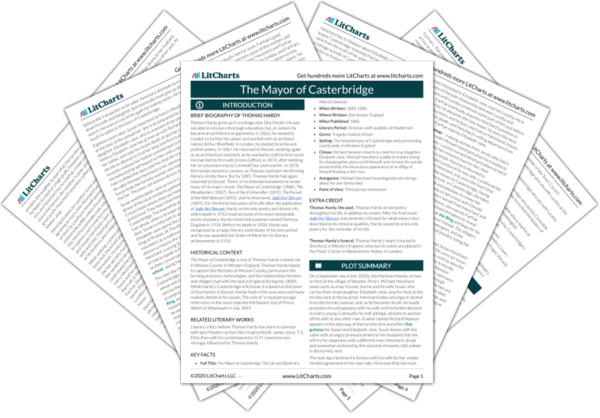Summary
Analysis
A royal personage plans to pass through Casterbridge on his way West and to change horses at the Golden Crown. The town decides to make a fine and welcoming affair of the event, as this royal personage has worked to promote the science of farming on a national level. The town prepares an address, and the council meets to discuss the proceedings. At this meeting, Henchard appears and asks to be able to walk with the rest of the council.
The reason Casterbridge wishes to particularly support this royal personage is his commitment to promoting and supporting farming across England. Casterbridge society demonstrates its primary focus and interest: farming. Henchard wishes to be a part of the celebration, despite his changed circumstances.
Themes
Farfrae is now the young Mayor of the town, and, in this position on the council, he is the one who must refuse Henchard’s request. Henchard’s interest in walking with the council to greet the royal personage was only a passing fancy, but the opposition, particularly from Farfrae, makes him determined to welcome the visitor.
Farfrae refuses Henchard’s request. Henchard sees this as a particular and personal affront, rather than realizing that Farfrae’s position as mayor made him the one to have to make the decision. Henchard rises to the challenge.
Themes
The celebratory day arrives and all the villagers appear at their best to welcome the visitor. Henchard sees Elizabeth-Jane in the street after he has primed himself with a glass of rum. He tells her that it’s lucky his drinking days have returned or else he would not have the courage to carry out his plan. Elizabeth-Jane is concerned and asks him about his plan, but he says only that he will welcome the royal personage.
Henchard drops a hint of his plan to Elizabeth-Jane. She has already been suspicious of Henchard’s motives and threats, and this, paired with his drinking, creates a dangerous combination of which Elizabeth-Jane is fully aware.
Themes
Elizabeth-Jane sees Henchard go into a store and reappear with a small union jack flag and a large rosette. She surveys the scene, noting Lucetta seated at the front of the chairs set up for ladies. Lucetta is watching her husband, as he stands with his friends. Henchard stands near her as well, but her eyes pass over him, and her behavior indicates that she will not acknowledge him in public any more.
Henchard’s actions seem innocuous: he purchases celebratory and patriotic items like the other villagers. Lucetta’s unwillingness to acknowledge Henchard shows her haughtiness. Henchard has fallen below her notice now that she sees him as no longer a threat, and those of lowly backgrounds do not receive her attention.
Themes
Get the entire The Mayor of Casterbridge LitChart as a printable PDF.

As the royal carriage arrives, a walking procession of the council is formed around it. Suddenly Henchard appears among them and steps directly up to the carriage, reaching out his hand to shake the hand of the royal personage inside. Farfrae, with the mayor’s authority, grabs Henchard and drags him away from the carriage. For a moment Henchard holds his ground before giving way.
Henchard attempts to greet the royal personage directly and must be dragged away by Farfrae. This conflict is both physical and public. Henchard had displayed his physical power, as when he subdues the bull, but here the power is Farfrae’s, as evidenced by his physical rebuff of Henchard.
Themes
Literary Devices
Mrs. Blowbody, a lady sitting next to Lucetta, asks whether Henchard wasn’t once Farfrae’s patron when he first arrived in Casterbridge. Lucetta exclaims that Farfrae could have found his footing in any town without a patron. The townspeople, including Longways, Coney, and Buzzford, recall Farfrae’s humble beginnings, however, and say how greatly he has changed since he sang that night at The King of Prussia. The rest of the royal personage’s visit happens smoothly and after the address and greeting Farfrae and Lucetta, he continues onward.
Lucetta dismisses the impact Henchard has had on Farfrae’s life and success. She sees her husband as solely responsible for their good fortune. Other villagers, however, have turned against Farfrae now that he is no longer a poor worker. Farfrae’s popularity has dwindled as he has raised himself above the villagers to a position of affluence.
Themes
The townsfolk disperse after the event. Longways, Coney, and Buzzford remain in the street, while many others walked back toward their homes in Mixen Lane. Buzzford mentions the skimmington-ride, which is being planned in Mixen Lane. As Farfrae has risen to such a prominent position in town as the mayor and a man of money, he no longer inspires the interest and sympathy of men like Buzzford, Longways, and Coney, as he once did when he sang at The King of Prussia. These three are less inclined to help Farfrae, but agree to make an inquiry into the matter.
Longways, Coney, and Buzzford discuss the skimmington-ride and whether or not they should protect Farfrae from it. These three men are not among the crowd seen at Peter’s Finger. Therefore, they are established as middle class, neither poor nor wealthy, and not enthusiastic about siding with either party.
Themes
Longways, Coney, and Buzzford would have been surprised to learn of the imminent nature of the plan for a skimmington-ride. At Peter’s Finger, Jopp says to the company that the event will occur that very night, so as to stand in sharp contrast to Farfrae and Lucetta’s prominence that day. For Jopp, the plan is not a joke, but his means of revenge on both the mayor and his wife.
The skimmington-ride is planned for that night to make it more painful after Lucetta and Farfrae’s day as the most prominent couple in town. The skimmington-ride is both a joke and a serious means for revenge. Those who view it as a joke do not stop to consider its consequences.
Themes












